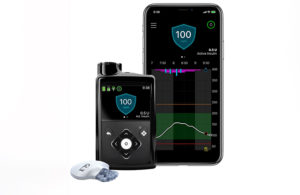
Results from real-world analyses in Europe and Chile, along with clinical data, were presented by Medtronic at the American Diabetes Association (ADA) 82nd Scientific Sessions in New Orleans.
According to a news release, the MiniMed 780G advanced hybrid closed loop system, designed with meal detection technology and automatic adjustments and corrections to glucose levels every five minutes, demonstrated improvements in glycemic outcomes that met consensus guideline recommendation of 70% time in range with less user interaction.
MiniMed 780G with the next-generation Guardian 4 sensor has not yet received FDA clearance, although Medtronic leadership anticipates the regulatory nod at some point during the company’s 2023 fiscal year.
The real-world data from 7,346 individuals in Europe — which represents the first real-world data reported with the Guardian 4 sensor — demonstrated improved user experience and strong glycemic outcomes. Individuals with recommended settings (active insulin time of two hours and target glucose of 100mg/dL) achieved the highest time in range (78.8%) and lowest time below range (1.8%).
A second real-world evaluation of 674 users in Europe compared users of the MiniMed 780G with Guardian 4 who previously used Guardian 3. Use of the Guardian 4 reduced SmartGuard exits and fingersticks, Medtronic said, indicating a reduced burden associated with the Guardian 4 while maintaining glycemic outcomes that are favorable and comparable to the previous generation sensor.
Medtronic’s real-world data from Chile covered 37 MiniMed 780G users with type 1 diabetes (aged 5-76 years) at 12 centers throughout Chile. Overall, the average time in range was 78.4%, the average glucose management index (GMI) was under 7% throughout the study, and 77% of study participants achieved both glycemic targets of time in range over 70% and GMI under 7%.
Individuals with recommended settings achieved the highest TIR (80.1%) and lowest TBR (2.6%). Time in range also increased from 68.9% to 79.5% in seven former MiniMed 640G users, and from 75.3% to 78.1% in 30 former MiniMed 670G users. The company said MiniMed 780G use in Chile allowed most users to increase time in range within two weeks and sustain it over six months.
Medtronic’s continued access study of 176 users after the U.S. pivotal trial demonstrated that, at three months with recommended settings, HbA1C was 7.1% overall with 7.2% for pediatric participants and 6.8% for adult participants. Time in range and Time below range among those groups was 74.7% and 2.1% overall, 72.7% and 2.4% for pediatrics, and 77.0% and 1.7% for adults.
“These data demonstrate that with less effort (fewer calibrations) individuals safely exceeded clinical consensus guidelines and mirror results of the pivotal trial which was originally conducted with Guardian Sensor 3,” Medtronic said in the news release.

